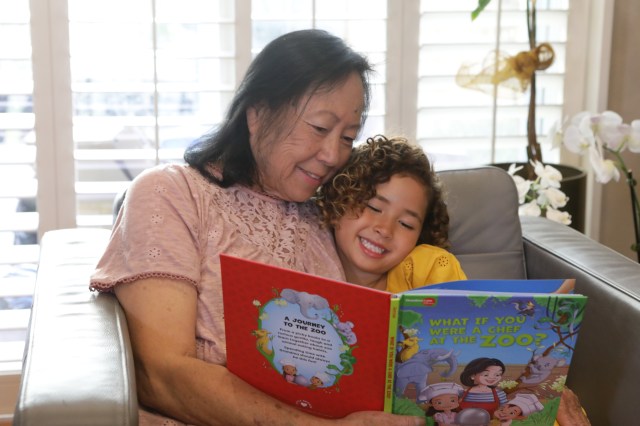
Did you know that reading aloud is the single most important activity you can do to help a child succeed in reading? It’s true! And here are just four of the many reasons why.
1. Builds Vocabulary
Young children learn words primarily through listening. Obviously, conversation plays a big role but reading picture books offers more rich and diverse language than child-centered conversations alone. And don’t worry about kids understanding every word. Just hearing the words in context is helpful.
2. Increases Focus
Unlike watching TV, being read to delivers a slower pace of ideas. Children learn to listen and concentrate as you explain the unfolding events of a story. Over time, this can help increase a child’s attention span.
3. Encourages Bonding & Creativity
There’s no question that your voice is the one that makes a difference! Snuggling up for a good read helps a child feel secure which allows her or his imagination to soar. Even books that seem beyond a beginner’s comprehension can mesmerize a child because of the rhythm of your language. Reading aloud to grandchildren is especially impactful in strengthening multigenerational relationships.
4. Fosters a Life-long Love of Reading
According to Jim Trelease, author of The Read-Aloud Handbook, “Every time we read to a child, we’re sending a ‘pleasure’ message to the child’s brain.” This creates a happy association with books and reading. Further, an enjoyable read-aloud experience often encourages a beginning reader who might be having difficulty mastering early skills.
There’s no way you can make a mistake reading aloud to a child. But here’s a tip. Before you read a book to a young child, experts often recommend you take a “picture walk” through the pages. This allows you to set the stage for reading by pointing out the setting. You can also ask your “Little” to make a prediction about what might happen next.
The beauty of building a strong read-aloud culture in your home is that it lasts for such a long time. Even when children can easily read on their own (9-11 years old), they love to listen to a book being read—and discussed—with them. My own sixth grade teacher knew this well. Each day after lunch she would sit at her desk in the front of the classroom and patiently wait for us thirty breathless kids to wind down our rowdy recess personas and give her our rapt attention.
At first we were insulted by the whole notion. How could the senior leaders of the elementary school submit to such a juvenile practice? Little did we know that after just a few days we would be absolutely hooked! To this day I remember her animated voice as she toured us through the classics. My personal favorite was A.A. Milne’s Winnie-the-Pooh in which a bear “of very little brain” obsessed about honey while teaching us all a thing or two about the important art of friendship.
When the class moved on to junior high level, the quiet regret of so many of us was that we had to leave our read-aloud time behind. In retrospect, I’m quite sure that those lovely hours spent appreciating the written word was one of the contributing factors that led to my own love of story—and my career as a children’s book author.
Remember, you don’t need a special occasion to read with a child. Parents often establish a bedtime routine with children but there’s no reason you can’t enjoy a read together any time! And time is also not a factor. Even a 15 minute ritual can reap major benefits.
So enjoy the read-aloud experience…and just watch the benefits grow!











